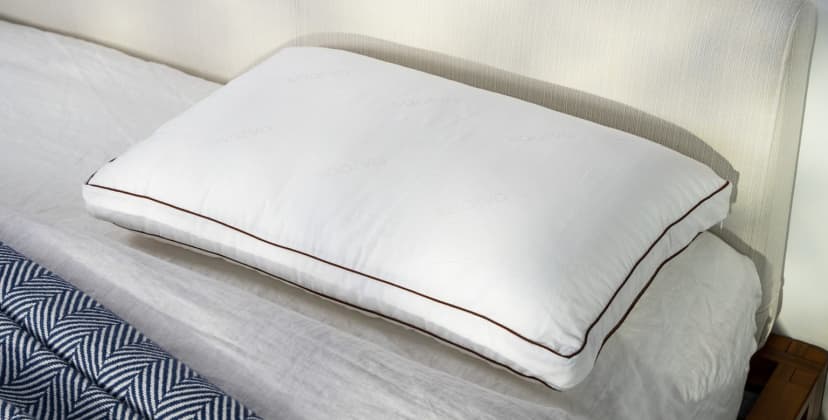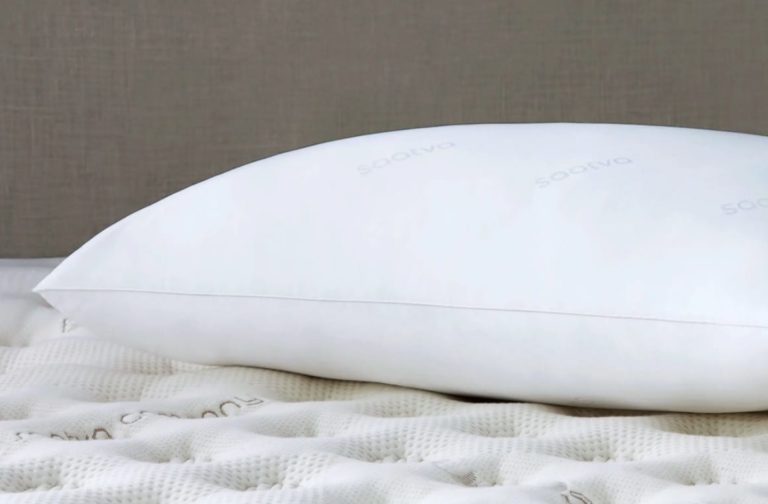When you buy through our links, we may earn a commission. Products or services may be offered by an affiliated entity. Learn more.
You spend a lot of time in close contact with your pillow, so it’s important to choose a pillow made from safe and healthy materials. Organic pillows are one way to ensure this. In addition to their environmental and health benefits, organic pillows are often highly breathable and extremely durable.
Many companies who produce organic products have a close relationship with their sources, giving back to the local communities or participating in other green initiatives. Organic wool and down are produced with improved animal welfare compared to traditional means. Whether they’re made of buckwheat, latex, wool, cotton, or other organic materials, organic pillows represent a choice that’s better for you and the planet.
There’s a wide range of organic choices on the market. We’ll describe the differences between different types of organic pillows and discuss how to know if a pillow is really organic. We’ll also share our top picks for the best organic pillows available.
The Best Organic Pillows
-
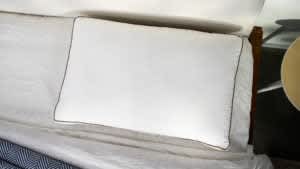
Best Overall
Saatva Latex Pillow
Shop Now
-
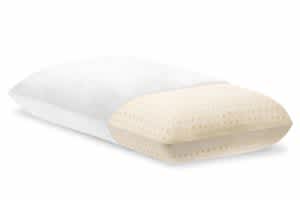
Best Value
Eco Terra Natural Latex Pillow – Solid
Shop Now
-

Most Comfortable
Birch Organic Pillow
Shop Now
-
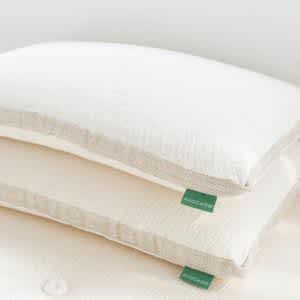
Best Luxury
Avocado Molded Latex Pillow
Shop Now
-
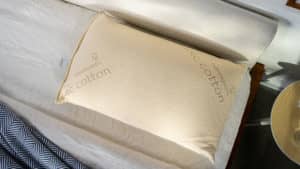
Best for Side Sleepers
Naturepedic Organic Solid Latex Pillow
Shop Now
-

Best for Neck Pain
Avocado Green Pillow
Shop Now
-
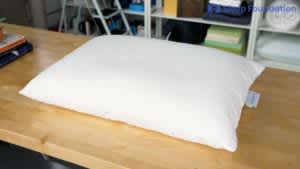
Best Hotel-Style
Boll & Branch Down Chamber Pillow – Soft
Shop Now
-
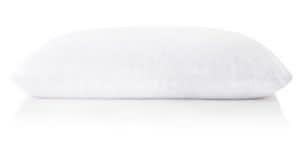
Best for Combination Sleepers
PlushBeds Organic Shredded Latex Pillow
Shop Now
-
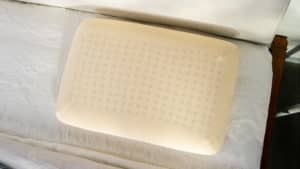
Best Neck Support
Turmerry Organic Latex Pillow
Shop Now
In-Depth Reviews
-
Pros
-
Adjustable loft
-
Breathable cotton cover, down alternative, and shredded Talalay latex allow minimal heat buildup
-
Plush, lofty, and supportive multi-chamber construction
-
-
Cons
-
Not suitable for sleepers with a latex allergy
-
Too thick for most stomach sleepers
-
Price Range
$165 – $185
Fill
Shredded Talalay latex and down alternative
Firmness
Medium Soft
The Saatva Pillow stands out from competitors due in part to its innovative chambered design. The outer chamber contains shredded Talalay latex, a soft and responsive material that provides excellent overall support. The inner chamber is padded with microdenier-based down alternative clusters that give the pillow a very soft and lofty feel. You can remove the inner pillow if you prefer a softer feel and thinner profile.
The Saatva Pillow is hypoallergenic, and the latex effectively staves off dust mites, mildew, and other contaminants. Latex is also naturally breathable, and the cover is composed of organic cotton for additional cooling. The pillow also retains its shape very well thanks to its gusseted edges, so you shouldn’t need to fluff it too often. Since the pillow has a medium soft feel, it is best suited to side and back sleepers who weigh 230 pounds or less.
You can remove the organic cotton cover and wash and dry it in any household machine. Queen and king sizes are available, and you can include a pair of sateen pillowcases with your purchase for a small extra charge.
The Saatva Pillow is reasonably priced and the company will ship for free anywhere in the contiguous U.S. You may return the pillow within 45 nights of your purchase, though Saatva requests you clean it first. All buyers receive a one-year warranty for their pillow, as well.
Best Value
Eco Terra Natural Latex Pillow – Solid
Use this SleepFoundation.org link for the most current discount on Eco Terra pillows
Shop Now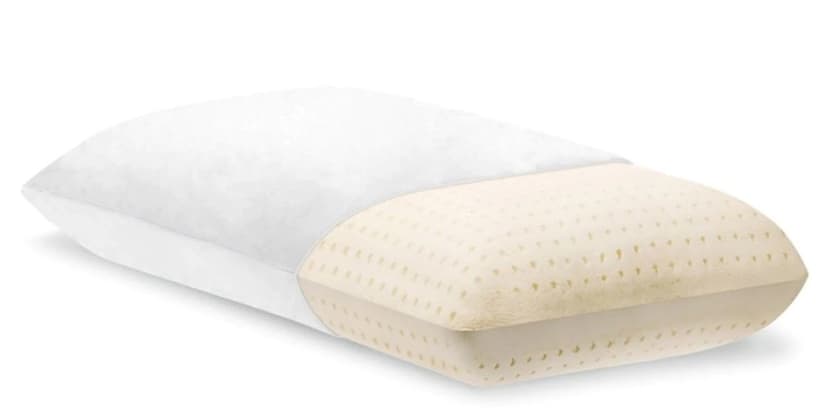
-
Pros
-
Responsive feel helps reduce pressure buildup
-
Breathable latex minimizes heat retention
-
Organic certification from GOLS and GOTS
-
-
Cons
-
May trigger symptoms in sleepers with a latex allergy
-
Pillow cannot be returned
-
Price Range
$109 – $129
Fill
Latex
Firmness
Medium Firm
The Eco Terra Natural Latex Pillow – Solid is a firm yet responsive pillow that conforms moderately to your head and neck. Our team found the pricing competitive compared to other latex pillows, which is not always the case with pillows that are made with such high-quality organic materials.
The pillow is composed entirely of latex encased in a breathable cotton cover. The latex offers gentle contouring but is generally firmer than other common fill materials such as down or down alternative. You can opt for a solid or shredded latex fill. Our testers recommend the solid latex option if you prefer strong support and less contouring.
If you tend to sleep hot, the latex has natural cooling properties that help minimize overheating at night. In addition, perforations in the latex help air flow more freely, so you can count on excellent ventilation. The latex and cotton are certified by GOLS and GOTS, respectively, to guarantee that all materials are organically sourced. The pillow is available in three sizes — standard, queen, and king. The standard size has a 4-inch loft while the other sizes are 5 inches thick.
Eco Terra ships free within the U.S. The pillows are non-refundable but they do come with a 3-year warranty to protect against construction defects.
Most Comfortable
Birch Organic Pillow
Use this SleepFoundation.org link for the most current discount on Birch pillows
Shop Now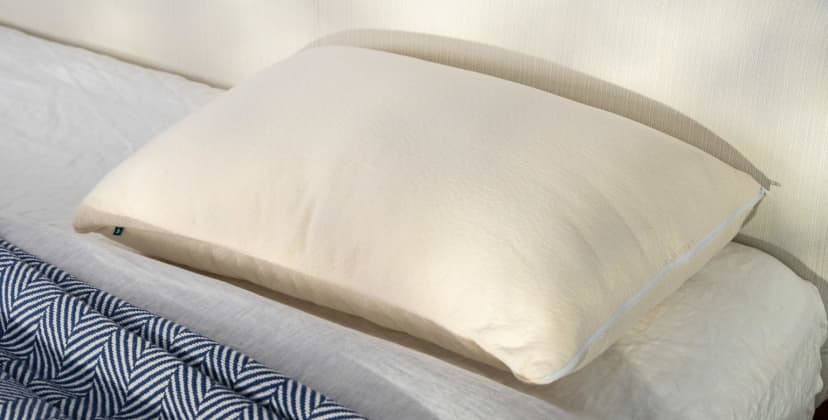
-
Pros
-
Springy and responsive
-
Shredded Talalay latex and wool fill feel plush while limiting heat accumulation
-
Comes with a 100-night sleep trial
-
-
Cons
-
May be too expensive for shoppers on a strict budget
-
Latex can trigger allergies in some people
-
Price Range
$149 – Standard $174 – King
Fill
Shredded Talalay Latex, Organic Wool
Firmness
Medium
Handmade in the U.S., the Birch Organic pillow combines the cooling advantages of organic cotton, natural latex, and cruelty-free New Zealand wool certified by Wool Integrity NZ and the PGC Wrightson Wool Integrity Program. The Birch Organic Pillow is Greenguard Gold certified for being free of harsh chemicals, and the cotton is certified organic by the Global Organic Textiles Standard (GOTS).
The pillow has a 2-inch gusset that helps it to keep its shape and maintain enough loft for side sleepers. The tufted organic cotton cover is very breathable and helps keep a dry, cool surface. Inside the pillow is a combination of shredded wool and Rainforest Alliance-certified Talalay latex. Both materials are naturally springy, durable, and breathable.
Wool also serves as a natural fire barrier, and it helps regulate temperature thanks to its moisture-wicking abilities. The Birch Organic Pillow is made with natural materials that resist dust mites and mildew.
The Birch Organic Pillow ships for free in the contiguous U.S. and is sold in queen and king sizes. Birch offers a 100-night sleep trial and a 3-year warranty against manufacturing and workmanship defects.
Best Luxury
Avocado Molded Latex Pillow
Use this SleepFoundation.org link for the most current discount on Avocado pillows
Shop Now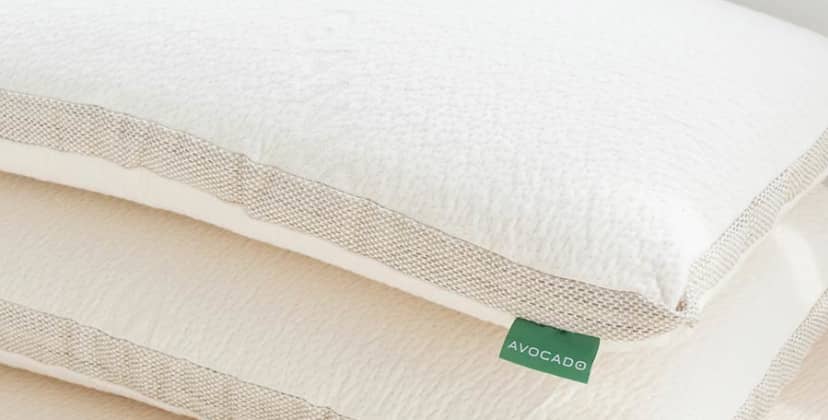
-
Pros
-
Core composed of solid, adaptive latex that cushions the head and neck without hugging too tightly
-
Excellent airflow and a breathable organic cotton cover help minimize heat buildup
-
Cover and core materials are sustainably sourced
-
-
Cons
-
May feel too buoyant for sleepers who enjoy deeply plush pillows
-
Stomach sleepers might prefer a softer, thinner pillow
-
Price Range
$99 – $119
Fill
Solid Charcoal-Infused Latex
Firmness
Medium Firm
The Avocado Molded Latex Pillow is not only made using organic and natural materials, but also beneficial for sleepers who wake up with stiff or sore necks. The solid latex core has a soft, adaptive feel and contours evenly around the head and neck without sinking or hugging too closely. A profile of 5 inches makes the pillow best suited to back sleepers, as well as side sleepers who prefer medium-loft pillows.
Latex also retains very little heat compared to foam, and the pillow’s core is ventilated with small holes to promote additional airflow. Another cooling component is the cover made of breathable organic cotton, which has earned a certification from the Global Organic Textile Standard – a leading authority for recognizing sustainably made fabrics. The cover can be removed and machine washed for easy care, but you should only spot clean the latex if stains or smudges occur.
The Molded Latex Pillow is available in standard, queen, and king sizes. You can also opt for a single pillow or a matching pair. Avocado offers free ground shipping throughout the contiguous U.S. Each pillow is handmade and backed by a 100-night sleep trial. Those who choose to keep their purchase also receive a manufacturer’s warranty covering structural defects for up to 1 year.
Best for Side Sleepers
Naturepedic Organic Solid Latex Pillow
SF Readers get 15% off sitewide at Naturepedic with code SF15
Shop Now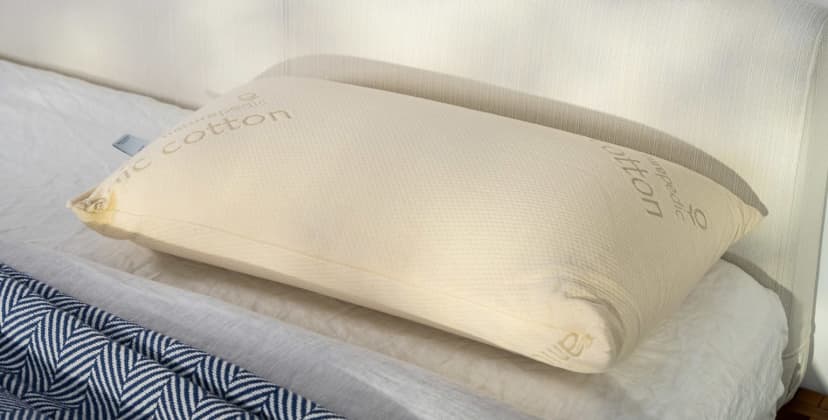
-
Pros
-
Breathable organic cotton cover helps regulate temperature
-
Organic latex core gently cradles the head and neck to relieve pressure
-
30-night sleep trial
-
-
Cons
-
Stomach sleepers may find the pillow uncomfortable
-
Not suitable for those with a latex allergy
-
Price Range
$129 – $149
Fill
Organic latex
Firmness
Medium
Latex pillows offer a balance of gentle cushioning and strong support to help alleviate neck pain, and the Naturepedic Organic Solid Latex Pillow is no exception. The pillow is made with a GOLS-certified organic latex core that cradles the head and neck without sinking too deeply or trapping heat. Sleepers who frequently experience neck pain may want to consider this pick.
The stretch-knit pillow shell is made from GOTS-certified organic cotton, a naturally breathable material that helps regulate temperature. Two sizes are available, each with a slightly different profile. The standard size measures 5.5 inches thick, while the queen size measures 5.75 inches thick. Thanks to the medium feel, both models provided relief to the neck and shoulders for our side- and back-sleeping testers while helping them maintain healthy sleep posture. To care for the pillow, spot clean as needed and use a pillow protector.
Naturepedic offers free shipping to customers living in the contiguous U.S. Organic Solid Latex Pillow purchases come with a 30-night sleep trial and a 1-year warranty that protects against structural defects.
Best for Neck Pain
Avocado Green Pillow
Use this SleepFoundation.org link for the most current discount on Avocado pillows
Shop Now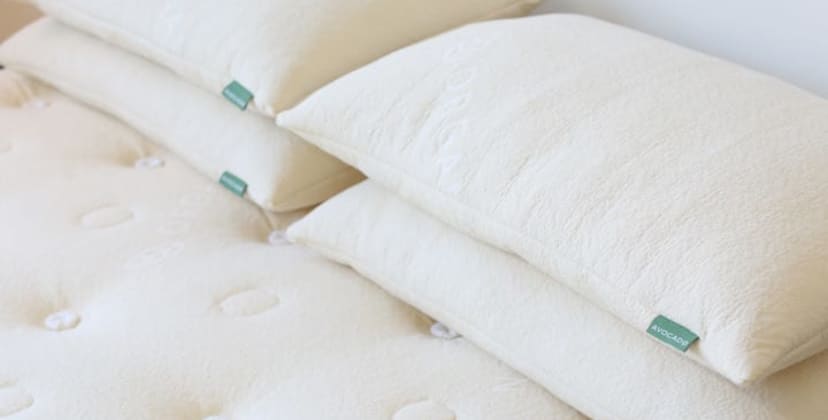
-
Pros
-
Customizable loft
-
Comes with extra fill
-
Constructed with certified organic latex, kapok fiber, and cotton
-
-
Cons
-
Not ideal for sleepers who enjoy soft, plush pillows
-
May be too firm for stomach sleepers
-
Price Range
$89 – $109
Fill
GOLS-certified shredded latex and GOTS-certified kapok fibers
Firmness
Medium
For sleepers who like having complete control over their pillow loft, the Avocado Green Pillow offers the option to customize the fill. A zippered cover grants easy access to a jersey cotton liner containing shredded latex and kapok fill, and it’s easy to add or remove fill until you reach a comfortable height. Each pillow is delivered with an extra fill bag so you won’t go short.
The quilted cover is made of GOTS-certified organic cotton and can be machine washed. The GOLS-certified Dunlop latex and GOTS-certified kapok provide a medium firm and slightly buoyant feel, offering a balance of support and contouring for the head and neck. Kapok fibers are naturally lofty and breathable, so they help keep the pillow fluffy and lightweight.
The Avocado Green Pillow is handmade in the U.S. and sold in standard, queen, and king sizes. It’s certified by Vegan Action to be free of animal products, such as wool, or byproducts that have been tested on animals. The pillow also holds GREENGUARD Gold, eco-INSTITUT, and OEKO-TEX Standard 100 certifications.
Pillows ship for free to the contiguous U.S. and come with a 1-year warranty. Shoppers also have 100 nights to try out the pillow.
Best Hotel-Style
Boll & Branch Down Chamber Pillow – Soft
Click this link for current Boll & Branch discounts
Shop Now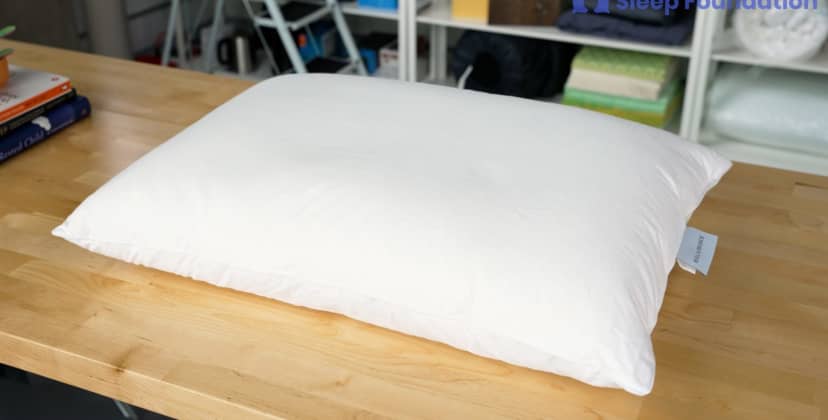
-
Pros
-
Chambered design ensures even fill distribution and above-average support
-
Breathable cotton shell offsets heat retention
-
IDS certification ensures humane animal treatment and conditions
-
-
Cons
-
Above-average price-point
-
Down may trigger allergies in some sleepers
-
Price Range
$159 – $219
Fill
White down, down/feather blend
Firmness
Soft
Boll & Branch’s Down Chamber Pillow evokes the durable construction and cosmopolitan style of bedding you’d find in a luxury hotel suite. Plush fill creates a cloud-like cradle for your head and neck, but the three-chamber design helps ensure even weight distribution and decent overall support. Three firmness levels are available, allowing you choose the best option based on your sleep position and personal preferences.
Our team personally tested all three designs. With the soft pillow, all three chambers contain real down and deep compression is to be expected. We found this model best suited to stomach sleeping because this position is typically most comfortable with low-loft pillows. The medium and firm pillows contain feathers in the core chamber and down in the outer chambers, so both versions offer more support than their softer counterpart. We recommend the firm pillow for side sleeping, and the medium for back sleeping.
Hot sleepers should find the Down Chamber Pillow comfortable. Although down naturally absorbs and traps some heat, the breathable organic cotton cover offsets heat retention to help you stay cool. The pillow should also appeal to animal-conscious individuals, as a certification from the International Down Standard honors Boll & Branch’s commitment to animal welfare. Standard and king sizes are available. The pillow is fully machine-washable, though some household appliances may be too small to properly accommodate it.
An accessible sticker price and free shipping throughout the contiguous U.S. make the Down Chamber Pillow a solid option for shoppers with limited to medium budgets. Your order includes a standard sleep trial that runs for 30 nights, though Boll & Branch extends the return period to 100 nights during the winter holiday season.
Best for Combination Sleepers
PlushBeds Organic Shredded Latex Pillow
Use this SleepFoundation.org link for the most current discount on PlushBeds pillows
Shop Now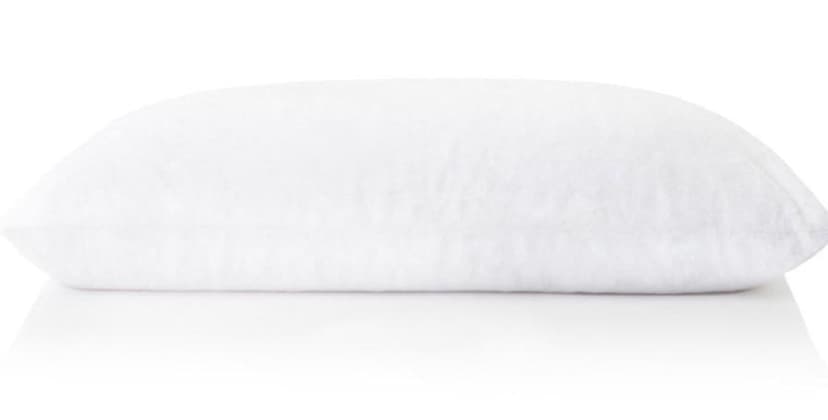
-
Pros
-
Filled with GOLS-certified organic shredded latex
-
Resists shifting and clumping
-
Competitive price for organic materials
-
-
Cons
-
Cannot be returned
-
May not feel comfortable for stomach sleepers
-
Price Range
$99 – $124
Fill
GOLS-certified shredded organic latex
Firmness
Medium
The Shredded Natural Latex Pillow from PlushBeds is an eco-friendly product that is also easy on your shopping budget. The pillow contains shredded latex that has earned certification from the Global Organic Latex Standard (GOLS), the same organization behind the GOTS. The fill feels plush and supportive, so you’ll receive ample cushioning for your head but shouldn’t sink too deeply into the pillow.
The latex also retains less body heat than foam, allowing the pillow to sleep quite cool, and the cover is made of GOTS-certified organic cotton for added breathability. The pillow is naturally hypoallergenic, as well, and should resist dust mites and other allergens quite well.
PlushBeds offers three sizes for the pillow. Standard sizes are constructed for a loft of 4 inches, while the queen and king sizes have a loft of 5 inches. The pillow should be spot cleaned, not washed or dried in a household machine.
The price-point is very reasonable compared to the average organic latex pillow and PlushBeds free ground shipping throughout the contiguous U.S. You’ll also receive a three-year warranty with your pillow.
Best Neck Support
Turmerry Organic Latex Pillow
Use this SleepFoundation.org link for the most current discount on Turmerry pillows
Shop Now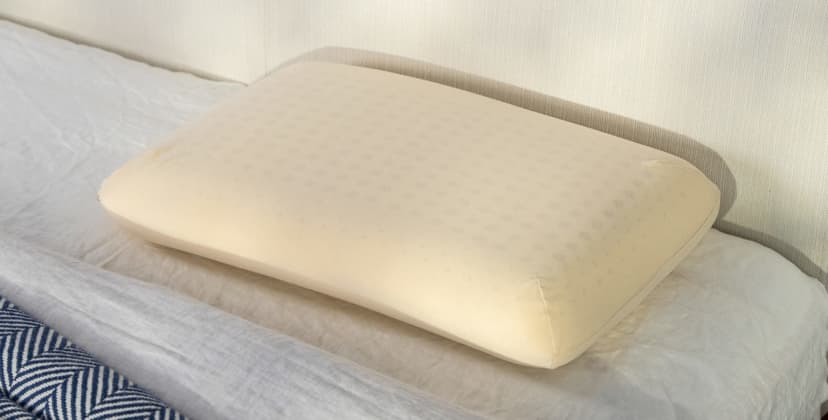
-
Pros
-
Latex composition offers a balance of contouring and support
-
GOLS certification ensures latex is organically sourced
-
Latex and cotton offer natural cooling properties
-
-
Cons
-
Not ideal for those with a latex allergy
-
May feel too responsive for sleepers who enjoy down-like pillows
-
Price Range
$80 – $120
Fill
Solid, ventilated GOLS-certified organic latex
Firmness
Soft, Medium, Firm
Many pillows rely on cooling gel infusions to help minimize heat retention. If you’re looking for a model that stays naturally cool, the Turmerry Organic Latex Pillow is a strong option. The pillow is made entirely of latex, a material known for its natural cooling properties. It also comes encased in a breathable cotton cover, making this an excellent choice for sleepers who run hot.
Shoppers may choose between solid or shredded latex inserts, both of which have GOLS certification to ensure organic sourcing. The solid latex model has a perforated design that helps improve ventilation, while the shredded option enables strong airflow between the latex pieces. The latex has a responsive feel that gently cradles your head without sacrificing support. This balance of support and contouring makes the pillow well-suited for back and side sleepers. The shredded model has a slightly plusher feel, if you prefer pillows that compress.
The pillow is available in a standard, queen, or king size. The latex insert may be spot cleaned with warm water then air dried. Turmerry offers a 30-day return policy and 2-year warranty with this pillow. Shipping is free to addresses in the contiguous U.S.
Best Organic Pillows Video
Watch our video below to get an in-depth look at some organic pillow picks from our testers in the Sleep Foundation Test Lab.
What is an Organic Pillow?
Organic pillows are any pillows made from organic materials such as latex, cotton, wool, kapok fibers, or buckwheat. Organic crops are grown without chemical pesticides, with farmers attempting to use less irrigation and produce less waste.
Environmentally friendly and biodegradable, organic materials are increasingly gaining in popularity as consumers realize the impact their purchases have on the environment. What’s more, organic certification often goes hand-in-hand with improved quality of life in the places where the raw materials are sourced.
As it’s virtually impossible for a customer to tell whether a finished product is organic or not, the USDA has established a set of regulations. In addition, there are several third-party organizations you can look to for assurance. The most commonly used are the Global Organic Latex Standard (GOLS) and the Global Organic Textile Standard (GOTS), which we’ll discuss more in detail below. Shoppers should be wary of a product that claims to be organic but doesn’t hold any certification.
Many companies advertise their products as “natural,” meaning the materials are not man-made. They are often biodegradable and less harmful to the environment than synthetic materials. However, farmers may use pesticides and chemical fertilizers to grow their crops, and the end products may contain bleach, formaldehyde, chemical dyes, or chemical fire retardants. This is why organic materials are generally considered safer for your skin and less likely to provoke allergies.
How to Choose an Organic Pillow
Within the world of organic pillows, you’ll see a wide variety of materials used. In general, you can count on organic materials to be more breathable and durable than synthetic pillows. That said, each material has its own specific benefits. In the following sections we’ll delve into the properties of different organic materials and how to choose the right organic pillow for you.
What to Consider When Purchasing an Organic Pillow
Your pillow is an important part of your sleep setup, supporting your head and providing a comfortable surface to lie on. In order to succeed at this, a pillow must have certain characteristics. Despite what pillow manufacturers may claim, there’s no one-size-fits-all formula for pillows. The ideal characteristics change from person to person depending on body type and preferred sleeping position.
Organic products are particularly susceptible to greenwashing, with many companies making claims they can’t back up. Only by carefully analyzing the specs of an organic pillow can you be sure that it will deliver the benefits it promises.
Loft
To provide full support, a pillow should fill the space between the head and neck and the mattress. Side sleepers tend to need a higher pillow to compensate for the breadth of the shoulders, while stomach sleepers need a flatter pillow to minimize twisting of the neck. If you’re unsure what loft is best for you, you may want to consider a pillow with adjustable fill.
Organic Certification
The organic industry has taken off in recent years, leading many companies to exaggerate their claims as an excuse to raise their prices. Certification from a trusted third-party organization can provide assurance that a product truly is organic.
Support
The most important job of a pillow is to support the head and neck, keeping them in line with the spine. A pillow that’s too soft, too thin, or too thick won’t provide adequate support and may lead to discomfort.
Firmness Level
Firmness level is not only a matter of comfort. A pillow that’s too firm may cause pressure points, but a pillow that’s too soft may fail to provide enough support. When considering pillow firmness, don’t forget to take the loft into account. A high but plush pillow will allow the head to sink in further, which ultimately reduces the loft.
Pressure Relief
Pillows provide pressure relief in two ways: by minimizing pressure at contact points, and by reducing pressure build-up in unsupported areas. Materials such as plush latex, kapok fibers, and cotton contour more closely and tend to provide better pressure relief.
Shape
The vast majority of pillows are made in the traditional rectangular shape, with some including a gusset around the sides to help maintain a higher loft. However, sleepers with neck pain or other problems may benefit from a cervical pillow designed to provide extra support by following the curves of the head and neck. Organic latex pillows are best for this, as the material can be formed into any shape.
Price
Organic materials tend to command a higher price, but it is possible to get an organic pillow without breaking the bank. If latex pillows and buckwheat pillows are out of your budget, you can also consider alternatives such as cotton or kapok fibers. Higher-priced options are often more durable, but most organic pillows will outlive those made with synthetic materials.
Quality Materials
For any people, “organic” is synonymous with “quality.” However, as always, it’s a good idea to check what exactly the pillow is made of, and whether it’s 100 percent organic or blended with other materials. Understanding the properties of different organic materials can also help point you to the right pillow for your sleeping style.
Moldability
One quality that many sleepers look for in a pillow is the ability to hug it or scrunch it into shape. Pillows made with fluffier fibers such as cotton or kapok lend themselves well to this, as opposed to solid latex pillows which are less moldable.
Temperature Regulation
Materials that allow room for airflow can help prevent heat build-up and keep a cooler sleep surface overnight. By nature, many organic materials fall into this category. Latex, buckwheat, kapok, cotton, and wool are all known for their temperature neutrality.
“Regulating your core body temperature during the night can make a huge difference in your overall sleep quality, so breathable materials are optimal to promote cooler temperatures. I recommend looking for breathable, natural fibers for bedding, pillows, and cooling sheets, especially if you’re a hot sleeper. Opt for more hypoallergenic materials like cotton, linen, silk, or bamboo, as synthetic fibers tend to be less breathable and trap more heat at night. Your body temperature needs to drop a few degrees to transition to sleep, so having breathable bedding that promotes cooler temperatures is optimal and can help assist with your body’s natural temperature regulation process at night.”
– Sarah Silverman, Psy.D., a licensed psychologist and holistic sleep wellness consultant who treats patients in New York and Florida.
What Are the Pros and Cons of Organic Pillows?
Organic pillows can be made from a number of different materials, but most organic pillows share some common benefits and drawbacks.
| Pros | Cons |
|---|---|
|
|
What Types of Organic Pillows are Available?
Common materials used in organic pillows include cotton, latex, wool, buckwheat, silk, down, and kapok. Both the cover and the fill should be organic in order for the pillow be considered 100 percent organic. Any materials that use chemicals in their manufacturing process, such as memory foam, are not considered organic.
Organic Cotton: Cotton can be woven into fabric and used to make a breathable cover, or used in its fiber form for a soft and fluffy pillow filling. While regular cotton production is problematic due to its use of water and pesticides, organic cotton uses less resources and avoids harsh dyes and bleach. Looks for the GOTS certification in both the pillow cover and filling, which indicates at least 70 percent organic materials.
Organic Latex: Latex is a springy, buoyant material favored by sleepers who like a breathable, extra-supportive pillow with moderate contouring. Natural latex is made from the milky white liquid of the rubber tree and can be processed in two ways, Talalay or Dunlop. Dunlop latex is usually the more sustainable choice, as Talalay uses more chemicals.
Organic latex is regulated by the GOLS certification, which requires that the latex be at least 95 percent natural. You may also see “natural latex,” made with a portion of synthetic materials, or fully synthetic latex, which is made of petrochemicals.
Organic Wool: Used in both the cover and the fill of pillows, wool from sheep, lambs, and goats is one of nature’s most impressive materials. Its crimped fibers provide a springy, supportive feel that’s perfect for pillows, and the material does an excellent job of wicking moisture to keep you warm in the winter and cool in the summer. Although wool can pose ethical problems, there are organizations that seek to highlight proper animal welfare and establish a humane shearing process.
Buckwheat Hulls: Dried buckwheat hulls naturally interlock to provide a firm and solid sleep surface. They are extremely breathable and offer great support, but some sleepers find they are too firm and make too much noise. They also tend to be among the more expensive models, and they may be too heavy to manipulate easily during the night.
Silk: Spun by silkworms, silk is a fine, smooth, and expensive fiber that is sometimes used as a filler for high-end pillows.
Responsible Down: The fine duck and goose plumage used to make down fill are prized for their incredible softness, although due to their high expense they are often blended with regular feathers to lower the price.
Down isn’t always a very ethical choice, as it’s often obtained from live-plucked birds. The Responsible Down Standard aims to ensure humane treatment of these animals, including rules against live plucking, force feeding, and other brutal practices. However, shoppers who object to avoid animal by-products or those with allergies may want to steer clear of down altogether.
Kapok fibers: Made from the fibers of the kapok tree, kapok has a lofty feel that’s somewhat similar to down. Kapok production is considered more sustainable than other crops as it requires minimal irrigation or pesticides.
What Organic Certifications Are There?
Various third-party organizations attempt to regulate the organic bedding industry so that consumers can rest assured they’re purchasing a safe and ethical product. The following certifications are some of the most common, indicating either that a product is organic or that it was produced with minimal environmental impact and low levels of harmful emissions.
- Global Organic Latex Standard (GOLS): The best organic latex pillows are certified by GOLS, a process that identifies latex sourced from organic plantations and processed into a finished product containing at least 95 percent organic material. It’s virtually impossible to make entirely organic latex, as it requires a small amount of chemicals in order to be processed.
- Global Organic Textile Standard (GOTS): The Global Organic Textile Standard certifies that a finished product contains at least 70 percent organic fiber. It also guarantees that the product does not contain toxic dyes, and regulates the treatment of wastewater from the production process.
- USDA Organic: Working together with the USDA, the National Organic Program (NOP) ensures uniformity in the production of organic-labelled materials. For a crop or livestock to be certified organic, it must be produced using approved methods, avoiding the use of genetic engineering, antibiotics, toxic fertilizers, and other prohibited substances. Among other requirements, animals must be raised under humane conditions, with access to the outdoors, and must be fed organic food starting from the last third of gestation. The USDA does not directly certify non-food organic products, instead encouraging companies to obtain the GOTS label for the finished product.
- GreenGuard: GreenGuard certification indicates that a product is low in volatile organic compound (VOC) emissions, otherwise known as off-gassing. Standard GreenGuard certification enforces safe VOC levels to minimize indoor air pollution. There is also a stricter category, GreenGuard Gold, which guarantees extremely low or zero VOC emissions.
- OEKO-TEX Standard 100: OEKO-TEX is an association of multiple research and testing institutes in Europe and Japan. The OEKO-TEX Standard 100 is an internationally recognized label awarded to products whose chemical levels fall within limits that are deemed to be harmless to human health. OEKO-TEX also awards other labels, among them the Made in Green label that ensures sustainability and ethical labor conditions.
- Eco-Institut: The eco-INSTITUT is an internationally recognized organization based in Germany that tests for pollutants and emissions in mattresses and bedding.
Frequently Asked Questions About Organic Pillows
How do I know my pillow is truly organic?
The best way to check if a pillow is truly organic is by checking to see whether all the components, from cover to fill, carry third-party organic certifications. The most recognized certifications are GOLS and GOTS, which certify organic latex and organic textiles, respectively.
How much do organic pillows cost?
Organic pillows can cost anywhere from $50 to well over $200 depending on the materials used to make them. They are one of the more expensive pillow types, although certain organic pillows such as cotton, feather, or kapok pillows may be more affordable than latex, down, or buckwheat.
How do I clean an organic pillow?
Care instructions for organic pillows differ depending on the material, although many pillows have removable covers that can be machine-washed.
Spot-cleaning is recommended for wool pillows. Pillows made with organic fibers like cotton and kapok can sometimes be machine-washed and dried on low temperatures, but this should be done carefully to avoid the pillow shrinking or forming clumps. Likewise, one-piece latex pillows may be able to be gently hand-washed as long as they are thoroughly dried. Buckwheat hulls, on the other hand, should be dried in the sun and never soaked in water or they will lose their properties.
When in doubt about how to clean your organic pillow, always check the manufacturer’s care instructions.
Where can I buy an organic pillow?
Organic pillows are widely available online, either directly from the manufacturer or through third-party websites that specialize in sustainable products. They are also available to a lesser extent in brick-and-mortar stores. Certain types of organic pillows, such as buckwheat, wool, or cotton-stuffed pillows, may be harder to find.
How long do organic pillows last?
Organic pillows are made with superior-quality materials that give them a longer-than-average lifespan. If properly cared for, some organic pillows can last for more than 5 years. In many cases, users can also purchase extra fill to liven up an older pillow and increase its lifespan.
Do organic pillows have an odor?
While organic pillows don’t off-gas in the typical sense, many new organic pillows do present a mild odor. This is most common with latex, buckwheat, and down pillows. In contrast to synthetic pillows, the odors from these materials shouldn’t be bothersome. However, they may provoke allergic reactions in those who are sensitive to the materials inside.

Still have questions?
Our product experts have extensive experience testing just about every sleep product on the market.
Send an email to [email protected] with your questions and we’ll help you find exactly what you’re looking for.

